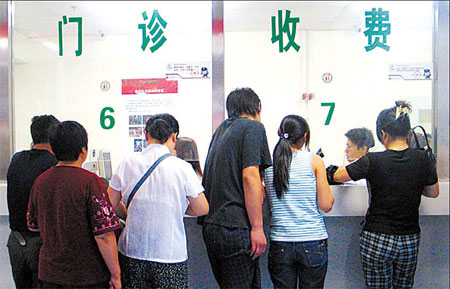Service to mankind or medicine for profit
By Shan Juan (China Daily)
Updated: 2008-04-23 08:06
Updated: 2008-04-23 08:06
Are multinational pharmaceutical companies doing mankind a favor by conducting clinical trials (on humans) or are they using Chinese people as guinea pigs to make more money? The question came to the fore again with a court hearing on a medical dispute in Beijing last week.
 People pay medical bills at a cashier's counter in a Beijing hospital in this file photo. Some patients in the country, suffering from chronic and infectious diseases but unable to afford high medical costs, reportedly turn to clinical trials for free treatment. Foreign drug firms are said to be attracted to China because of low costs and a rich pool of patients. Wu Changqing |
Ouyang Lidong, 36, of Hunan province, was admitted to Beijing You'an Hospital in 2006. Doctors diagnosed he had complicated liver problems and only a liver transplant could save his life. Since a donor liver was not immediately available, the hospital doctors recommended on Dec 5, 2006, that he be put on extracorporeal liver assist device (ELAD), or an artificial liver. Developed and manufactured by Vital Therapies Inc., California, the ELAD is designed to help liver failure patients survive till a donor liver is available or another mode of treatment is found, says the US Food and Drug Administration (FDA) website. The device, however, has not been approved for use in the US.
Ouyang was part of a free trial program, and his wife He Binying accepted the offer in a desperate bid to save his life. But he soon developed complications, including rising blood sugar levels, breathing problems and hemoptysis (coughing up of blood from the respiratory tract that indicates a severe infection of the bronchi or lungs), which proved fatal.
But before that - in fact, as soon as he developed the new complications - his wife requested the doctors to put him off the ELAD. Her requests went unheeded till Dec 7. And by the time the therapy was stopped, Ouyang's condition had deteriorated. He was transferred to the intensive care unit (ICU) later, and died on Dec 27, 2006.
A few days after his death, He Binying filed a lawsuit against the hospital, alleging that its doctors' negligence had caused the death of her husband. "Before we signed the paper giving consent for the use of the ELAD, the hospital authorities had promised to stop the therapy as soon as any adverse effect or discomfort was detected. They had insisted it was very safe, too," she says.
"They made the wrong recommendation for the ELAD trial, which is more suitable for acute liver failure, whereas my husband had been suffering from hepatitis B for 12 years." Worse, they broke their promise and continued the trial despite his worsening condition, she says.
The hospital lawyer, on the other hand, argued in court last week that the couple had signed the consent form before the trial, and knew full well the efficacy of and potential risks associated with the ELAD. "That should be enough to exempt the hospital from any legal liability," he said.
Also, Ouyang's condition was serious, and the doctors had diagnosed that he had been suffering from the life-threatening hepatocirrhosis, and the only known cure was a liver transplant. "It was natural for the hospital to have recommended the therapy to prolong his life so he could get a donor liver," the lawyer said.
A Beijing Youth Daily report on June 19, 2007, quoted hospital Vice-President Duan Zhongping, who also heads the institution's Artificial Liver Treatment & Training Center, as having said that before putting Ouyang on the ELAD, the doctors had tried it on 28 other patients and none had died.
Vital Therapies Inc. announced on Jan 4, 2007, that it had received positive response for its clinical trials on the first 45 patients at Beijing You'an and 302 Military hospitals. "Our center has treated a large number of patients with other mechanical and bio-artificial liver therapies, and although the data for ELAD are preliminary, none has looked more promising than ELAD to impact a patient's long-term survival from a single treatment," Duan said in the announcement.
Ouyang's case does not seem to have changed the course of ELAD treatment, for the center has said it would continue with the trials till 90 consenting patients undergo the therapy. The center insists, too, that no significant harmful effects have been attributed to the ELAD, and has not posted any details of Ouyang's case. "The ELAD trials in our hospital have been approved and commissioned by China's State Food and Drug Administration (SFDA), which is authorized to approve and oversee clinical trials in the country," Duan said. But according to the paper, SFDA's Medical Device Department official Hu Xueyan denied that Duan had said so.
|
||
|
||
|
|
|
|

